The post Thank you, please call again soon! appeared first on Linda Smallbones.
]]>16 December 2024
Thank you
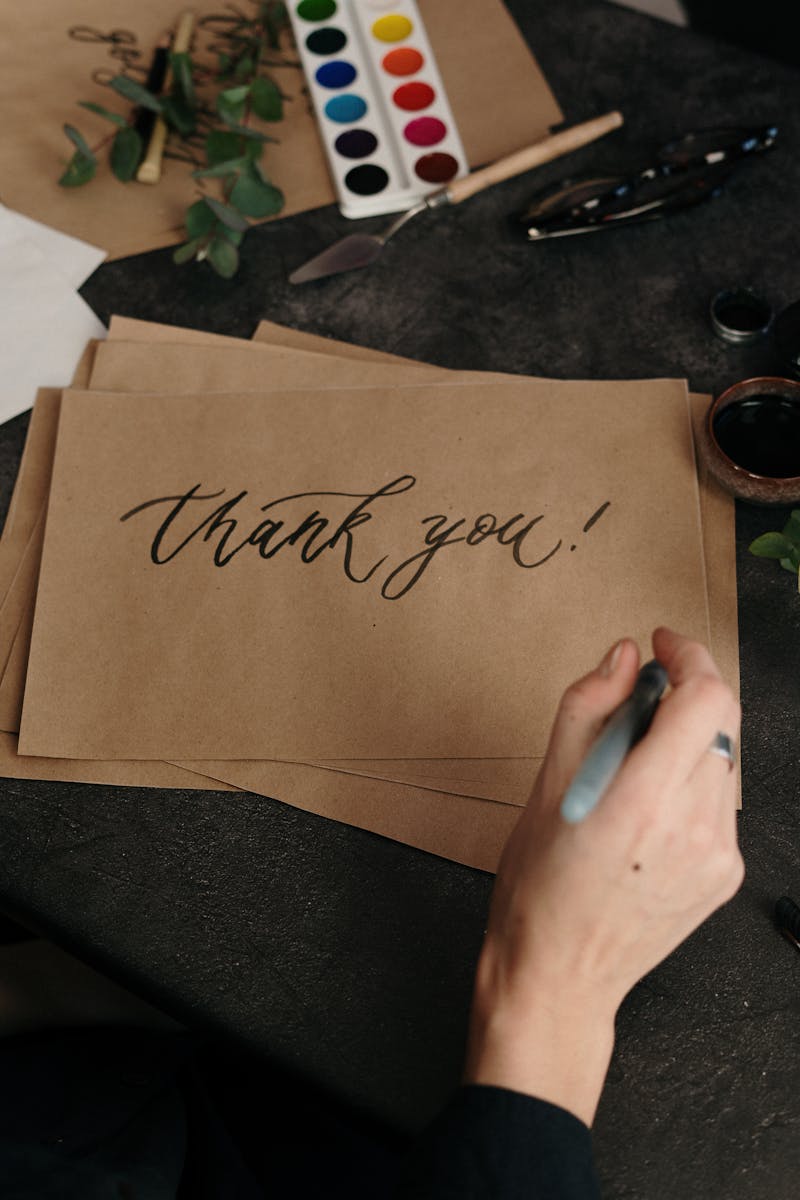
Photo by cottonbro studio on Pexels
I am so thankful to do what I do. I absolutely love my job, I love working with kids, I love working with parents. Yes, that is YOU! If I could sit and write a note of gratitude to each of you, I would. And my gratitude is about this; your trust and your relationship.
I am grateful that you have trusted me to work with your child (or children) this year. I do not ever take this lightly. As a parent who has taken my child for therapy in the past, I know this is not a small thing. I appreciate the sacrifices of time and resources you make to bring your child to therapy. I appreciate your support of me as a small business owner.
I meet so many lovely people every single year, and you are no exception!
Thank you to you if you are not a parent, but you have attended a workshop or course with me. I enjoy those times so much and I so appreciate your time and engagement! Thank you to all who have read my blogs and given me feedback, I really appreciate and welcome that!
Merry Christmas

Photo by Jamie Street on Unsplash
To you and your family, may you have a safe, joy-filled Christmas and New Year! May you have opportunities to laugh, be with people you love and like, and eat lots of Christmas mince pies (I may be projecting here… just a bit!)
Here’s a recommendation for your holiday viewing… That Christmas on Netflix is such a lovely movie, highly recommended for the whole family!

2025…
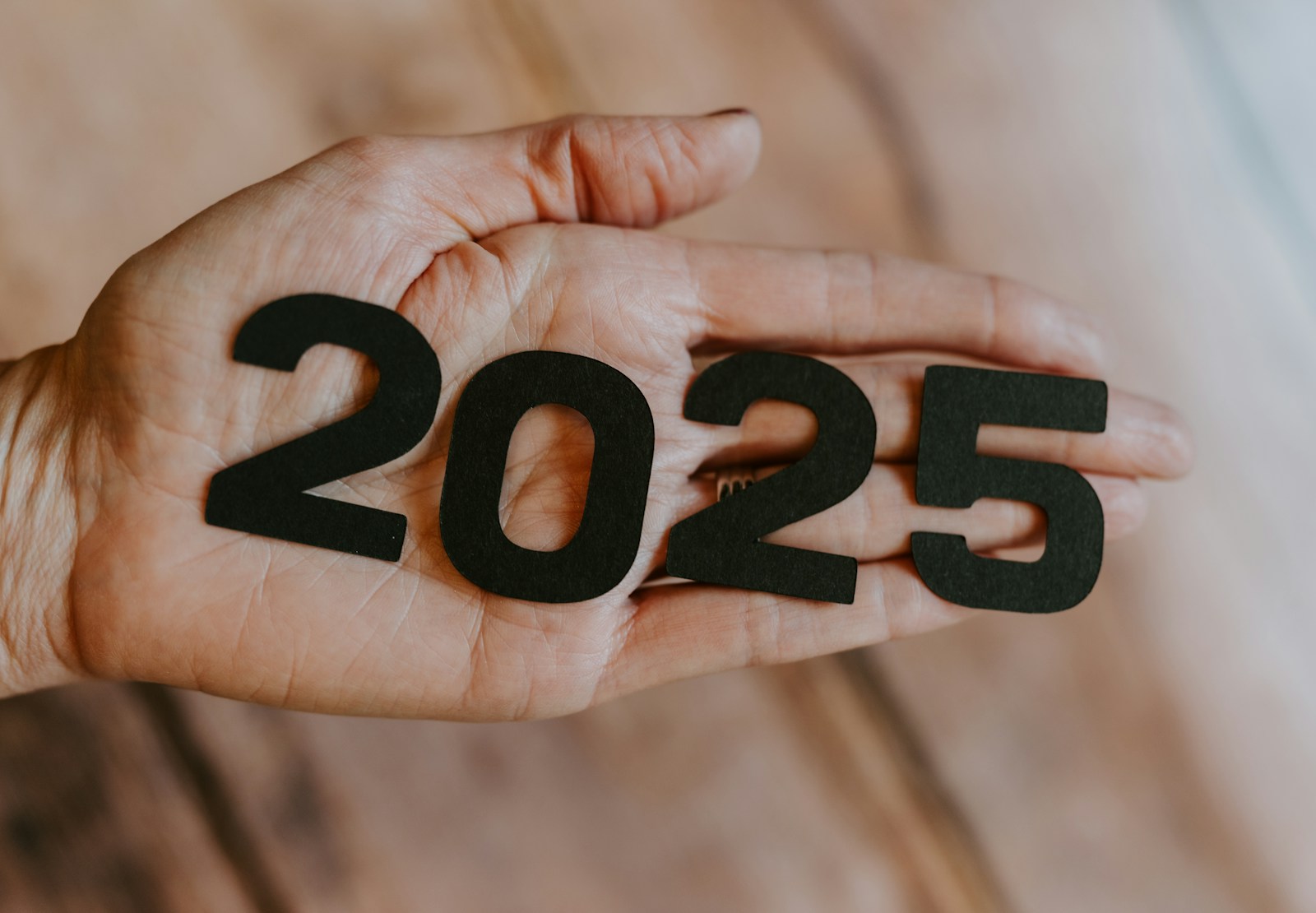
Photo by Kelly Sikkema on Unsplash
GUYS! I am SO looking forward to things to come in 2025. I am working (with some fabulous people) on some great things and I cannot wait to let you know what’s coming up!!
That’s all from me for this year, folks.
I re-open on 6 January 2025.
Thank you and please call again soon!
The post Thank you, please call again soon! appeared first on Linda Smallbones.
]]>The post The ability to respond appeared first on Linda Smallbones.
]]>23 November 2024
David Whyte, an Irish poet says that the word responsibility means “the ability to respond”. He says that we (adults) have made responsibility a heavy burden; all the things that we have to lug around and take care of, we think about work, home and financial responsibilities. We think about our responsibility towards family and towards our children. In our widely held definition, taking responsibility is work and burden, not an act of love.
We have all these meme’s about “adulting”, they’re funny. But they tend to perpetuate this perception that grown-up life is heavy and onerous, that there is no other way. David Whyte says that no wonder the teen suicide rate is so high; looking towards a future of burden and heaviness is not very hopeful, is it?!
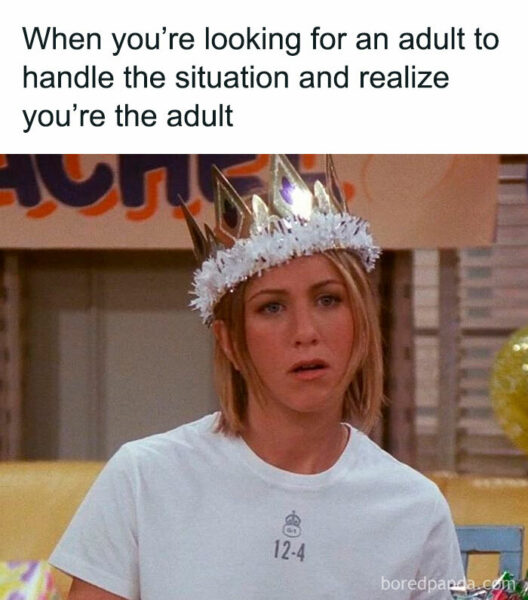
What if the definition of responsibility is not merely something it is your duty to do, an obligation, but is the ability to respond, doesn’t that change a whole lot?! There are things, situations, people every single day that we get to respond to, rather than think of as a burden or obligation.
We don’t always have a great ability to respond, sometimes our energy/resources are at a diminished capacity. This is called being human. When we are aware our capacity to respond is diminished, we can proceed with caution in order to protect our limited capacity, and maybe to find ways to increase capacity by asking for help, or taking a break. We can always work on our ability to respond and try to do better. If we focus on responsibilities being a burden, they just seem to get heavier.
If you think about all the things your regard as your responsibilities and then reframe these by asking yourself what your ability to respond is to each of them, how does that change things for you?
Do you have an ability to respond to this initiative?
At this time of year, we have opportunities to respond to the needs of others in many ways. I am loving thinking of giving as my ability to respond to what I see as a need, rather than a burden. With this framework, I give within my capacity with a generosity of spirit, and not out of obligation.
I walked into my local stationary shop the other day, funnily enough it’s called Local Stationers, and they had a Christmas tree which immediately caught my eye. And then I noticed on the tree were all these tags. Here’s the genius thing they’re doing; each tag has the first name and age of a child and a piece of stationary they will need for school in 2025. You take a tag (or 10) and buy the item on the tag. The items get placed in a box and will ultimately be given to children in a local children’s home in January in time for school.
I love this!! It’s easy and because you have a name and age of a child, you feel a bit of a connection to the person you are buying for. If you’re in the Howick area and have the ability to respond, please do!
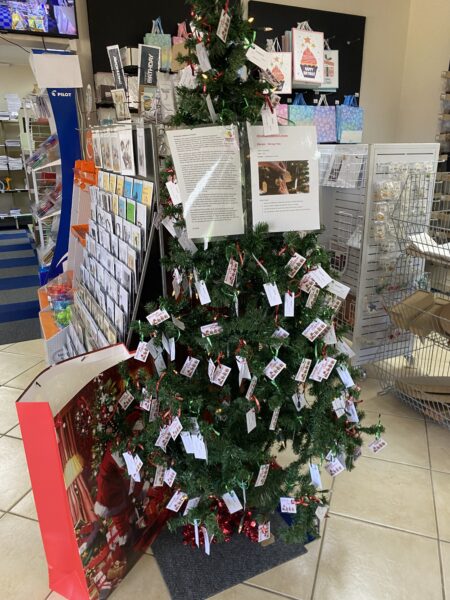
Reminder: FREE Journalling Session coming up!!
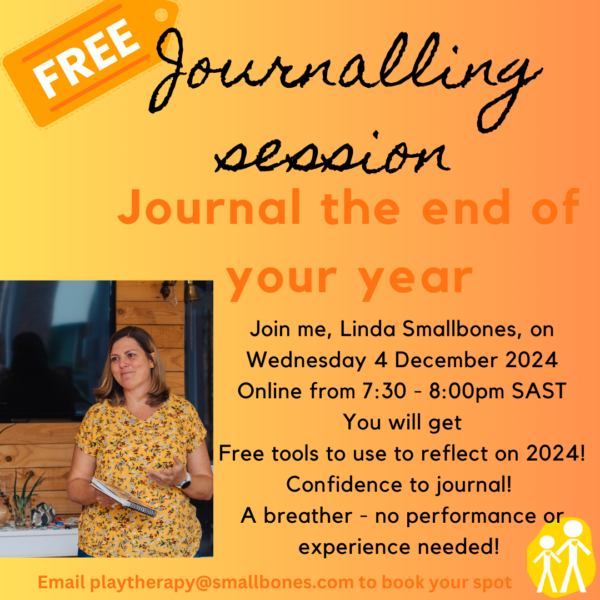
The post The ability to respond appeared first on Linda Smallbones.
]]>The post Introducing a small project with mighty results. appeared first on Linda Smallbones.
]]>15 November 2024
On any given weekday afternoon, you can arrive at Ethembeni’s Family Centre in Mpophomeni, the home of the Education Support programme (Ed Support) and find between 60 and 70 children ages 5 to 21 years engaged in meaningful academic activities. Facilitators are trusted, caring adults who lead small groups of about 15 children, helping them to do homework and projects. The children who attend regularly are diligent and committed.
This is an After School Programme (ASP) that started in 2012 and has been a source of support, education and fun for hundreds of children since.
In their own words…
“I love Ethembeni because the Aunties (facilitators) love us, they help us with homework and sometimes they give us jerseys to make sure that we are warm in Winter.” K.Z., 12 year old.
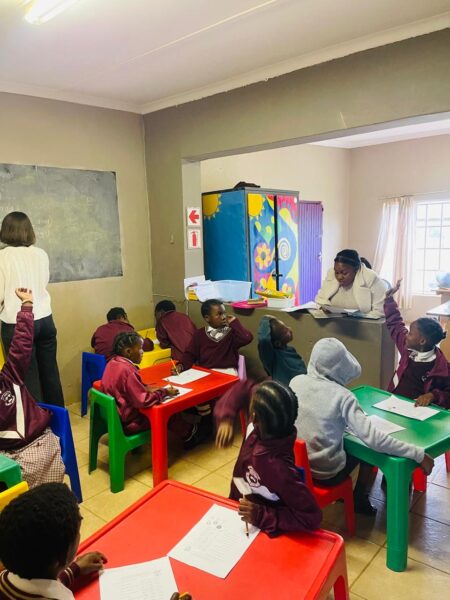
“I love coming to Ethembeni because I get helped with my homeworks and projects.” E.P., 12 year old.
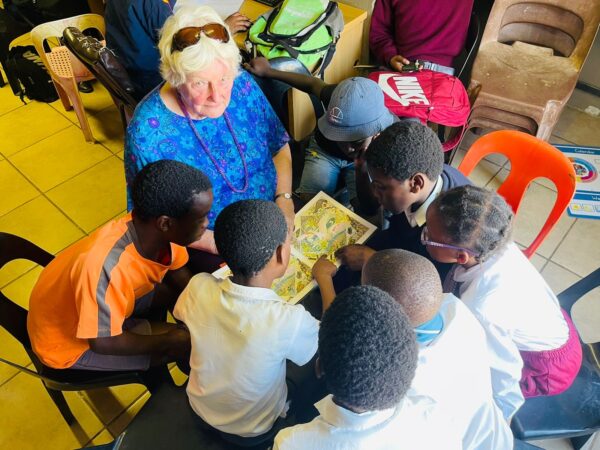
Why is such a programme needed? The schools in Mpophomeni are quintile 2 schools, serving the second most impoverished portion of the population. This picture illustrates the inequality gap between the different quintile schools.
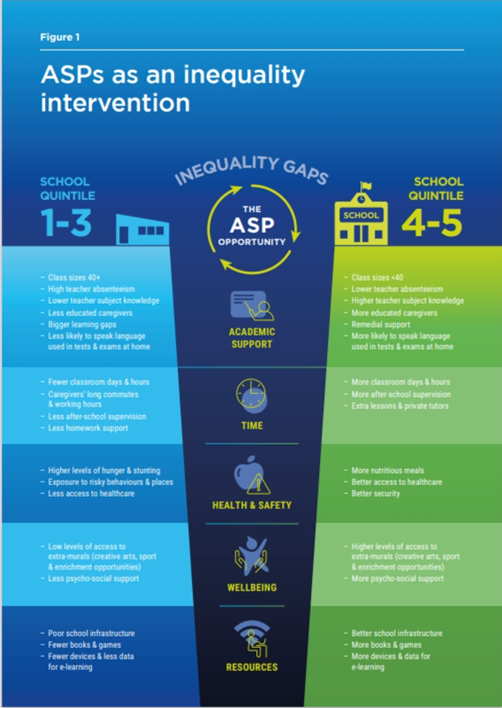
Source: After School Programmes in South Africa: The Investment Case by Joy Olivier. 2021
I sat down with Sindi Manyoni, the current manager of the Ed Support programme to talk about what she does and why she does it…

Sindi, how did you end up working here?
In September 2017, Sofe (founder of the Ed Support programme), asked me to come and volunteer. I was working at PicknPay at the time. I gave up paid employment to come and volunteer here. A while later, Sofe advocated for us to receive a stipend which we did start receiving.
You left paid employment to volunteer here, why?
I’ve always had a passion for working with kids and I feel like I want to make sure that I am their safe space. I really loved the job because I was studying towards a degree in teaching. It was so much fun! Being able to be there for the kids was important to me.
I went to Howick High and I had teachers who were there for me, like Mrs Beard my art teacher. If it wasn’t for Mrs Beard’s kindness to me… I want to be a Mrs Beard to those kids. I get so emotional when I talk about this! (Note: Lindi Beard is still teaching at Howick High making a difference in learner’s lives every year).
Mrs Beard was everyone’s favourite teacher and everyone loved her. She made me feel special. I became pregnant in grade 12 and she supported me emotionally. She bought me things I needed. She is such a lovely person and a mentor.
So, I want to be there for these kids like she was for me. These are vulnerable children and sometimes the teachers just don’t have time. Education Support is where kids can relax, we build relationships and we are their safe space.
Let’s talk about teen pregnancy, especially in Mpophomeni…
My pregnancy in Matric is not something I hide. I tell the girls what I went through, because honestly, it is so difficult. I talk about the challenges and I talk about the importance of continuing your education even after having a baby. Without a Matric there is just nothing after school. I managed to finish my exams and I passed.
You are carrying on a legacy, mentoring and inspiring children everyday. What are you hoping your legacy will be?
I hope this expands. I hope we do get funding, I would be so devasted if Ed Support were to stop. I would still choose Ed Support over teaching because these kids really rely on us and I would be devasted if the project stopped. Even if they don’t have homework, some of them just need to be here because home is not always a good place for them to be. This is where they are free. This is more than academics, it’s about the mental and emotional wellbeing of the children.
This is something I want to work in and be a part of in the future. I turned down a job a while ago, earning a lot more, but it’s worth it because I love my job here!
What does it look like on a day-to-day basis in the centre?
It changes everyday, and I feel like each term is different. Like term 3, last term, was project term and it was packed every afternoon.
The children come after school and are placed in small groups with a facilitator. They get help with their homework, or ask for help where they are not understanding their work. We have volunteers coming in to help improve children’s ability to read for meaning once a week. We have “Fun Fridays” where we do baking or cooking or a craft or sport. Mostly, we continuously build relationships. We are a small team of 4 facilitators, and currently have an overseas volunteer with us for a few months.
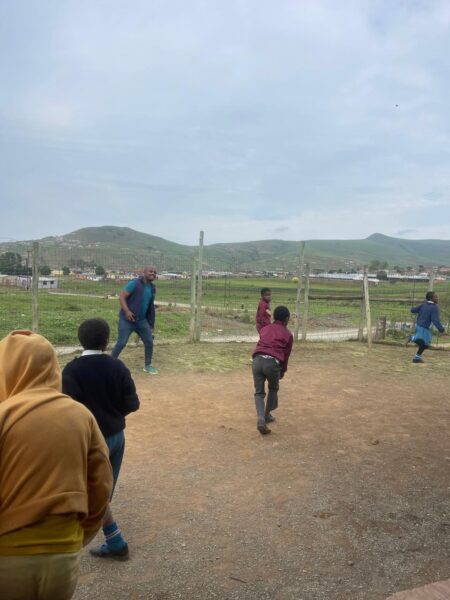
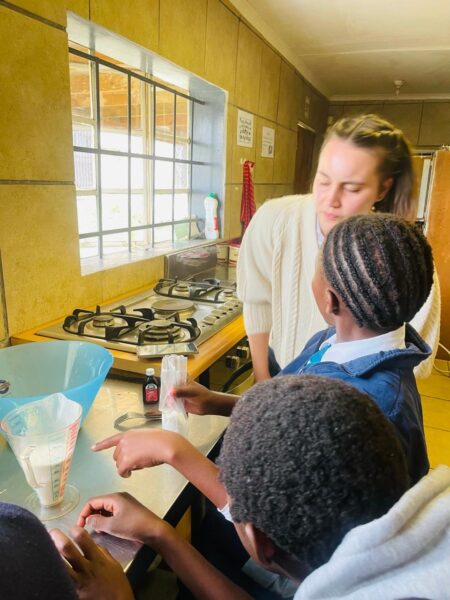
What has Education Support Achieved?
Statistics kept over the past 7 years (2017 to 2023) by the Ed Support team reveal the following;
No girl child attending Education Support in the past 7 years has fallen pregnant whilst being a member of the programme. This is significant as teenage pregnancy rates for 2022/2023 in South Africa were at an estimated 150 000 girls between the ages of 10 and 19 years old. A key protective factor in preventing teenage pregnancy is supportive relationships, which the Ed Support facilitators consistently provide.
Between 2019 and 2023 a total of 38 learners stayed part of the programme and matriculated from it in grade 12. 36 of these 38 learners passed Matric.
In 2023 100% of the learners attending Ed Support who wrote Matric passed and several of these matriculants have come back to volunteer at the programme. MANY previous matriculants have are in (or have been in) tertiary education.
Learners attending Education Support stay in school. The dropout rate of learners in South Africa is extremely high. According to StatsSA in 2024, 3% of 15 year olds and 9% of 17 year olds dropped out of school. When learners are attending Ed Support at Ethembeni, they stay in school.
Given the context of education in South Africa, these are incredible achievements! However, currently Ed Support has very little financial support and the programme’s sustainability is in jeopardy.
Please give supporting this incredible project some serious thought. You can read the full report on the case for investment in ASP (after school support)2021-Investment-Case-for-After-School-Programmes. This programme is an absolute necessity to the community of Mpophomeni.
Ed Support is run by Ethembeni, a small but MIGHTY non-governmental organisation in Mpophomeni. Ethembeni receives absolutely no government funding. They provide essential services to the community of Mpophomeni and have been doing so since 2000. Please consider making a generous donation to the Ed Support programme this Christmas time.
You can find out more about Ethembeni at https://www.ethembeni.co.za/. Sindi and her team are always willing to have visitors and talk in person about the work they are doing.
You can make a donation:
Bank : First National Bank
Name : Ethembeni
Type of Account : Current
Account Number : 620 596 318 72
Bank Code : 220725
Swift Code : FIRNZAJJ
Full disclosure, I am a board member of Ethembeni. This is a volunteer position and I get no compensation for being on the board or for writing this article. This is close to my heart and I continue to be astounded by the work and impact such a small number of people achieve in the lives of so many. I have a long history with Ethembeni as I was employed as their social worker between 2007 and 2013. I know the integrity of the organisation and the quality and depth of the work they do. I continue to be extremely proud to be associated with them.
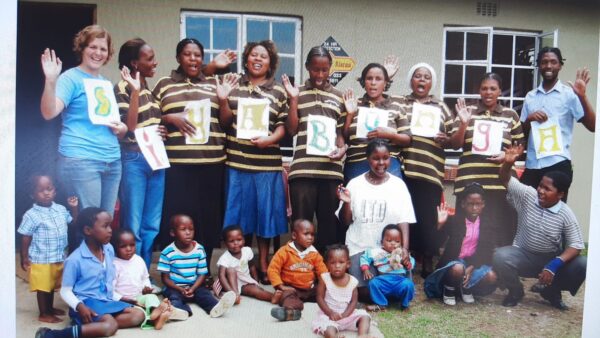
So, there’s me over on the left back in the day! These are some of the little ones we worked with in the ECD centre.
A HUGE thank you to Ethembeni staff and many behind-the-scenes volunteers who carry on the amazing work. May this Christmas be the best yet for you and your families and especially for those you so faithfully serve!
The post Introducing a small project with mighty results. appeared first on Linda Smallbones.
]]>The post Am I the problem? appeared first on Linda Smallbones.
]]>25 October 2024
I don’t take lightly the fact that dozens of parents each year take the step to make an appointment with me and talk about the need for play therapy for their child.
For some, this can be an incredibly vulnerable space. Perhaps because of the turmoil they’re going through. Perhaps because it’s a shock that play therapy is even suggested for their child in the first place. Perhaps because their story is hard to share. Perhaps because they carry huge amounts of guilt as a parent.
And the questions at the back of a parent’s mind may be “Will she judge me for saying this? Will she blame me? Am I the problem?” They may even ask themselves “What have I done wrong?”
I don’t judge parents, because I am one. I am a very imperfect one. In working with parents I try to be the person I wish I had beside me in my most difficult parenting moments when our kids were little.
I’m celebrating where we are at in the parent-child dynamics in our house right now, but as we all grow and develop, anything could happen and we as parents may be the ones needing professional support. And we will seek it if we need it, as we have before. But the key is finding the right person for the time you’re going through. The person you can share the things that you need to share, and hopefully can help you see a different perspective.
As the parent, am I the problem?
This question tries to apportion blame. Blame brings in guilt and shame and can actually shut down communication and emotional availability. Guilt takes up so much emotional energy, and diminishes our availability to be there for our children in meaningful ways.
Children are mostly referred for play therapy when their behaviour is challenging or concerning in some way. Behaviour is data. I believe a key part of the therapeutic process is for parents to gain a perspective on how they either help or hinder their child towards healing.
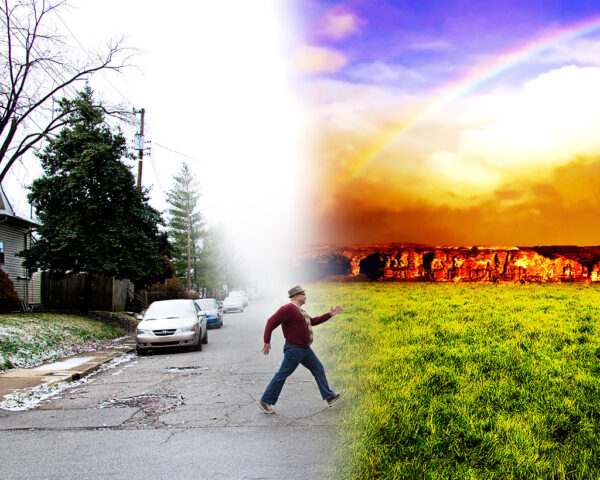
“New Perspective – Teleidoscope 01” by Michael Taggart Photography is licensed under CC BY-NC 2.0
It doesn’t matter who we are or what we know; we all have blind spots, we all bring a dynamic that is unique to us and is influenced by our stressors. With the best intentions, we can’t always see what we are doing or not doing that is in some way negatively influencing our child.
A Story
(Not a true story, but based on true to life events in a collection of cases). A family experience a traumatic event when their youngest child has a near drowning experience. The child is saved and completely fine, there is massive relief. But, there is a residue of fear left in the older child who witnessed this, it was absolutely overwhelming as can be expected and her anxiety escalates over time.
The parents have told and re-told the story to family and friends over the days and weeks after the event, often in the presence of their children. The older child is affected the most by this. Inadvertently, they repeatedly expose the child to the trauma in a way that adds to her overwhelm, helplessness and fear. She is flooded with fear as if the event were happening again and again as she hears it retold.
Realising this, I was able to work with the parents and inform them of the way this was impacting the child. Are these parents a “problem” ?- no absolutely not. Talking through a trauma such as this is often a way adults cope and make meaning of it. It made sense that they talked about the experience from their perspective. And they can do so in their own time, without repeatedly exposing the children.
The parents in this example took on the information I gave them and stopped talking about the event in front of the children. Which in turn influenced the healing journey for the older child and enabled the anxiety to dissipate. They gained a new perspective. They didn’t need to apportion blame or feel guilty. They learned new information and acted accordingly, and saw further healing for their child.
All of this to say…
As parents, we are each on our own journey. Could we better parents? Always (Pick me!!) Could we benefit from some intentional personal growth, increased self awareness and self-love? Definitely (Please pick me!!) We don’t change or thrive in atmospheres of judgement and guilt. (Neither do our children.) We may just thrive in an atmosphere of acceptance, safety and compassion.
I have some things for you!
I love supporting parents. Because I am one. I love what I learn when I talk to other parents. As we start to wind down this year, I have been thinking about ways to make space for you. There are three!
Firstly, a FREE Journalling session on 4 December. Journalling is a fabulous way to reflect on being a parent, and to care for yourself. I wrote about it here and here.
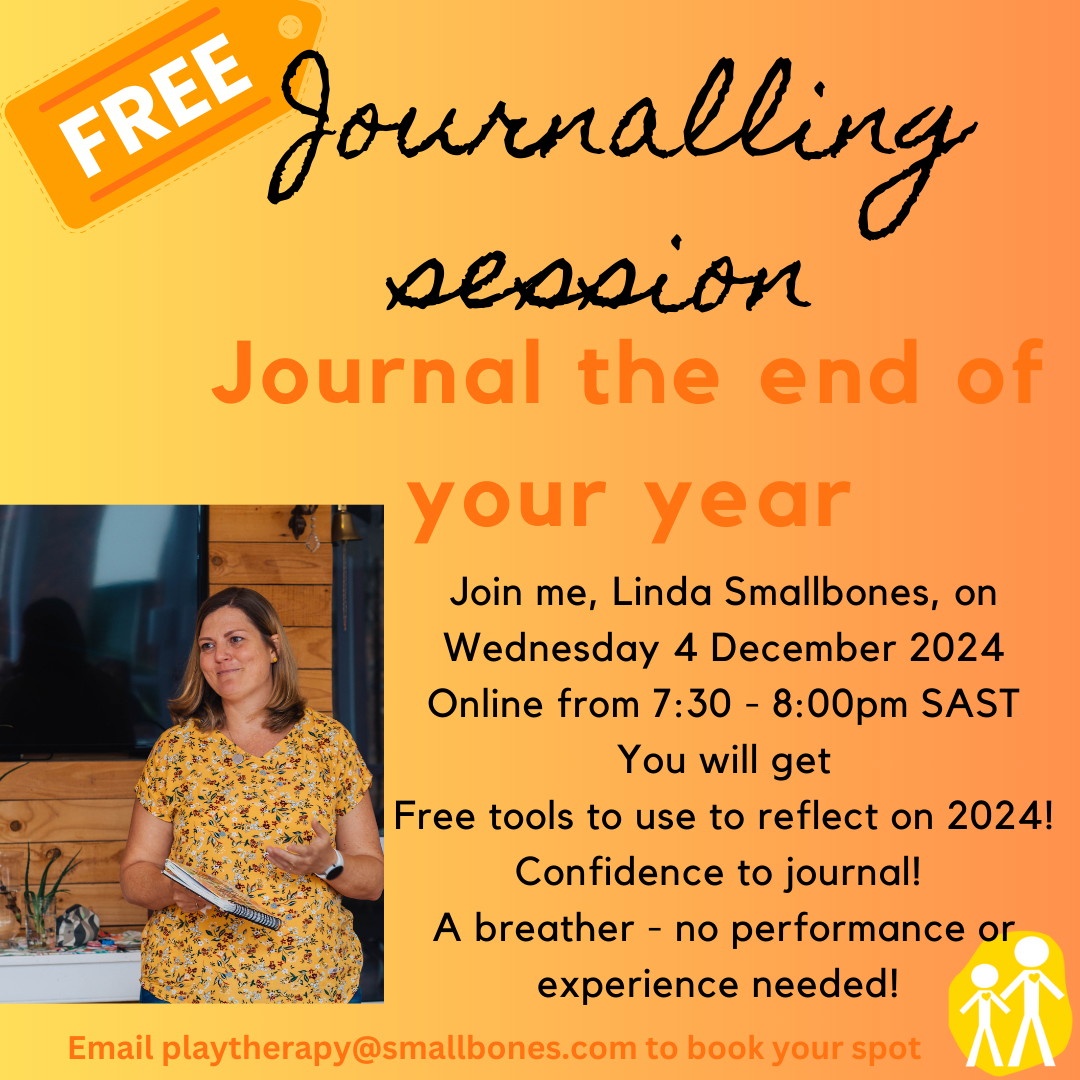
The second offering I have is Parent Conversations. I have previously written about it here.
Parent Conversations is what the name implies; a safe space to talk about pertinent parenting topics. I have run this several times in person before and this time it will be going online! The process is newly updated and upgraded. I am excited to share some new learning I have had as a professional and parent over this past year. These conversations happen over four weeks and each week has a particular focus.
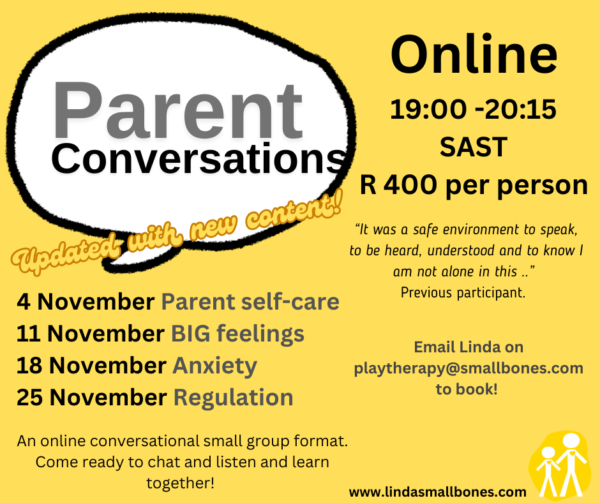
Lastly, Parenting for Connection which you can find out more about HERE.
What’s the difference between Parent Conversations and Parenting for Connection?
Parenting for Connection is now an 8 week journey, which goes deeper and further in supporting you to cultivate deeper connection with your child. Parenting for Connection can be done one on one, or in a parent couple or in groups.
The post Am I the problem? appeared first on Linda Smallbones.
]]>The post On Not Being Polite appeared first on Linda Smallbones.
]]>4 October 2024
I have been telling my children recently when not to be polite.
Don’t let people walk all over you – if sports is a metaphor for life…
On the sports field, don’t be polite. You don’t say “please” when trying to get the ball away from your opponent. One hockey match, I was watching my daughter’s team and all the girls on both sides were being so polite and tentative. Eventually I yelled out “Stop being polite!” If we were polite on the sports field, it would be extremely boring.
I do NOT mean that one must be a bad sportsman or woman. Be a great sportsperson, but don’t be polite.
Sidebar (Sort of), have you seen this video of Siya and Eben? Two men who are fantastic sportsmen, but on the rugby field they are anything but polite! https://www.youtube.com/watch?v=pjtT3ZbrfEE

Your body boundaries are yours…
Another time to not be polite is when someone is crossing your body boundaries. We teach our children to shake hands, hug and kiss relatives and adults, that to show respect they must do these things. But what if an adult crosses a child’s body boundary, their sense of what they’re comfortable with, in making physical contact?
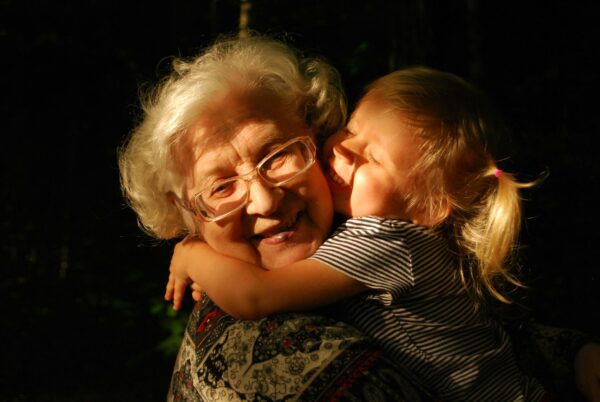
Touch that is wanted is powerful. Photo by Ekaterina Shakharova on Unsplash
What if, instead of insisting on a particular type of contact, we have conversations with our kids about what kind of greetings they are comfortable with. We could offer two or three simple options. “We’re going to see aunty and uncle. We like to greet them by saying hello and you can choose if you want to shake hands, or give a hug, or just wave and smile at them. What would you like to do?” and then offer your support in carrying this greeting plan out.
Where possible, having a conversation with the adults in question beforehand is helpful. You can explain that you’re teaching your child about their body boundaries, and supporting their discovery of what is comfortable and not comfortable. This is especially important with neurodivergent children and children you know aren’t fond of physical contact in general.
I use this example of interactions with family as it could be a training ground for life for our children. A way to help them take ownership and responsibility for their bodies and what is OK and not OK. It may shift and change over time and with different people, and that is OK. Children know who they feel safe with and who they don’t, we need to honour and support our children’s intuition in this regard.
NO is a full sentence
As my children head deeper into “teenagedom”, I want them to know that they do not have to be polite when it comes to others trying to cross body boundaries (or any boundaries) they are not yet ready to cross, with peers or elders. And that they can say “No”, no explanations needed. As a colleague said to me the other day when we were talking, in her family “No is a full sentence.”
So many people in positions of influence and power have abused people around them; sexually, emotionally, and spiritually. If my children feel the need to always be polite to people in power, they may also feel they cannot say no when asked to do something that goes against their values, body boundaries or sense of safety.
Being polite means we feel we have to smile and nod and say “yes, of course.” That’s what “nice” people do, right?? And who does not want to be seen as a “nice” person? The fact is, people who groom* children for abuse, are nice and they exploit children’s natural urge to be polite and respectful to their elders.
Parents can start this conversation with their children, giving them permission to not always say “yes” if they feel a boundary has been crossed in any way, or if they feel ill at ease. Teaching our children that it is OK to say “no” and then come and speak to us about it.

Photo by cottonbro studio on Pexels
What do you think about “not being polite?” I would love to hear your take on this.
*Grooming is the process of an adult favouring and singling out a child and showering gifts/praise/treats/attention on them to win their trust before embarking on abusive behaviour.
The post On Not Being Polite appeared first on Linda Smallbones.
]]>The post The worst therapy dog in the world appeared first on Linda Smallbones.
]]>13 September 2024
Ziggy. Is the worst therapy dog in the world.

I don’t know if you have ever encountered one of those therapy dogs (or cats or horses) that assist people emotionally and physically? They are truly amazing. They are used in all sorts of different settings; old age homes, children’s homes, hospitals and in play therapy sessions.
“A therapy dog can assist a play therapist by creating an environment where young clients feel comfortable and unconditionally accepted. The dog can also act as an ice-breaker by promoting conversation and communication between the therapist and clients, creating a climate of trust and safety. A dog’s playful nature facilitates playfulness in therapy.” Dr. Sune Scholtz (Educational Psychologist)
Well, Ziggy is the opposite of the above. He is self-centered, needy, entitled and has no clue what empathy is.
Some of you and/or your children may have met Ziggy at our house. Often by mistake as he’s supposed to be indoors for the duration of play therapy sessions. But every now and then he makes a break from prison and joins us. His one redeeming feature is that he is quite cute. And most people don’t mind giving him some attention. If they do, I immediately dispatch him back to where he should be.
He has no body boundaries whatsoever.
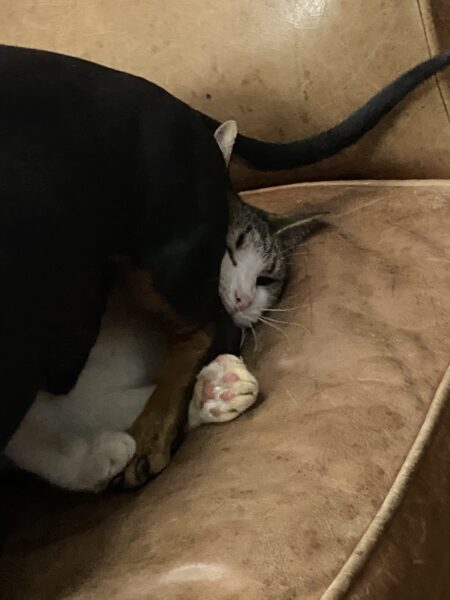
Ziggy sitting on the cat.
Ok, so there are a couple of redeeming features of him being around during play therapy. He does create conversation. And for children who love dogs, they really do enjoy him being there and they often ask for him. Maybe his very neediness makes people feel special and wanted? Mmmm, maybe. And, once he settles down and lies on the cushion on the floor, he falls asleep and keeps us company. Until such time as we do anything active and he wants to be in on the fun!
And, of course, in his defense he has not been trained to be a therapy dog. He only knows how to Sausage Dog and he does so very well.

In our home, he does have the important role of chief live hot water bottle.
We love our pets, and Ziggy is slightly mad, but special. Even if he is the worst therapy dog in the world!
The post The worst therapy dog in the world appeared first on Linda Smallbones.
]]>The post An Interview with a Sandplay Facilitator: Bongekile Ngcobo appeared first on Linda Smallbones.
]]>6 September 2024
Bongekile and I have crossed paths through our working and personal lives over the last decade or so. She’s a fellow professional I respect and admire and one thing I love about her is she is always willing to try new things, she’s intentional about self-awareness and personal growth. Bongekile is a Sandplay* facilitator with Ukuthula Sandplay, a non-profit providing Silent Group Sandplay to those who would not normally be able to access therapeutic services.
*for an explanation of sandplay see the end of this article.
Let’s start at the beginning and find out more about Bongekile’s journey with sandplay and how she ended up being a facilitator.
How did you find out about Sandplay?
I saw on Facebook or LinkedIn that they were looking for Sandplay facilitators and so I signed up for the training. I was really curious about the silence of the sandplay experience. My background and training is around dealing with trauma and process facilitation, all of which involves talking, so I was curious about how this silence would work!
How was the training for you?
Before stepping into the training I knew we would be playing with sand, but I pictured us rolling in a sandpit! Then, I learned we use a sandtray and not a sandpit!
In the first session I was questioning; “Is this going to work?” I also kept thinking to myself; what do I do? Why am I doing this?
The second session I started to just be there and I stopped judging the space. I started to focus on myself. In this session I started to see how this silence and space would be helpful to others.
I had a lot of expectations going into the training, and the subsequent 6 sessions I had with Lindi. I expected there to be an interpretation of my sandtray, but this is not how the process works. The process allows the individual to find personal meaning in their sandtray.
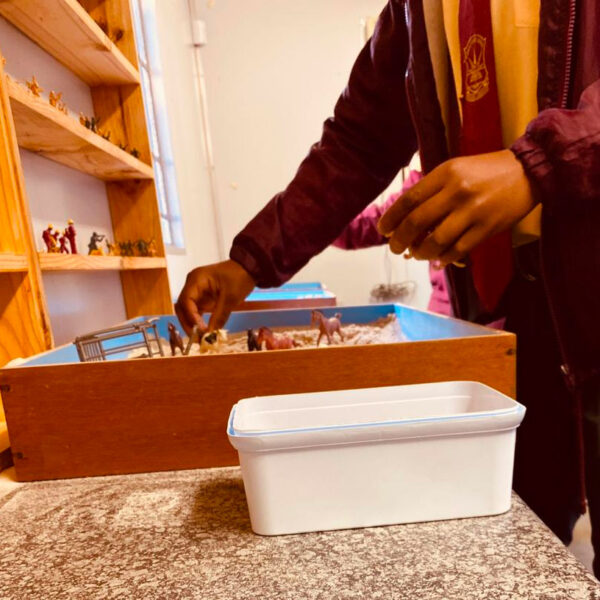
What has the facilitation experience been like for you?
You facilitate groups of 6 people at a time. I started working with teenagers first, they definitely process a lot. You can see the changes that happen over the course of the 6 sessions. After each session, once participants have left, the facilitator takes photos of each sandtray to keep safe for them. In the final sessions, they have the opportunity to ask questions and you facilitate a reflection. At the end of 6 weeks they can request a feedback session one on one with the facilitator.
Why would you recommend sandplay as a therapeutic technique?
Each individual needs a space and silent moment to be present to themselves. A space for processing whatever comes up. Sandplay gives people space, and as you continue with sessions it becomes more of a practice everyday to be present to yourself. We live in such a fast paced world, sandplay helps you to slow down.
How do you see sandplay being relevant in a South African context?
People go through a lot, there is a lot of trauma. Mental health services are very scarce and very expensive. Sandtray contributes to the service gap in communities where there are fewer resources dedicated to mental health, it provides a way for people to safely process emotions.
Could you share a story from your experience as a facilitator?
In one group, a man in his 60’s got to week 4 of the process and commented that he always used the same miniatures in his sandtrays each week. He asked if he was maybe not creative. I told him that this is his process and that he is using what is meaningful to himself. As the 6 weeks finished off, he commented that he enjoyed the play that sandplay allowed him as an adult, saying that it had been a very long time since he had really played. He stated that when you stop playing, you enter into adulthood.
“It is so important to awaken our play!” Bongekile.
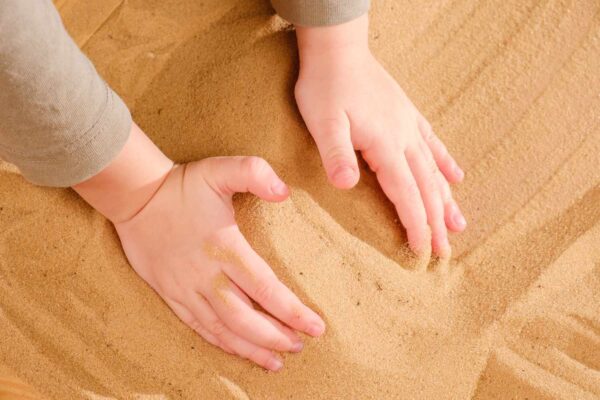
Thanks to Bongekile, Lindi and the Ukuthula Sandplay team for all the amazing work you are doing in communities.
Information about Ukuthula Sandplay
Anyone can benefit from a sandplay session. It is gentle and non-invasive. The individual sets their own pace and makes their own creation in the sandtray.
To find out more about Ukuthula’s work, have a look at their lovely website https://ukuthulasandplay.com/
You can book sandplay sessions for yourself, or for a group. Contact Lindi on [email protected]
You can make more therapy available to those who wouldn’t normally be able to afford mental health services by making a donation to Ukuthula. There are ways to donate on the website https://ukuthulasandplay.com/get-involved/
What is Sandplay?
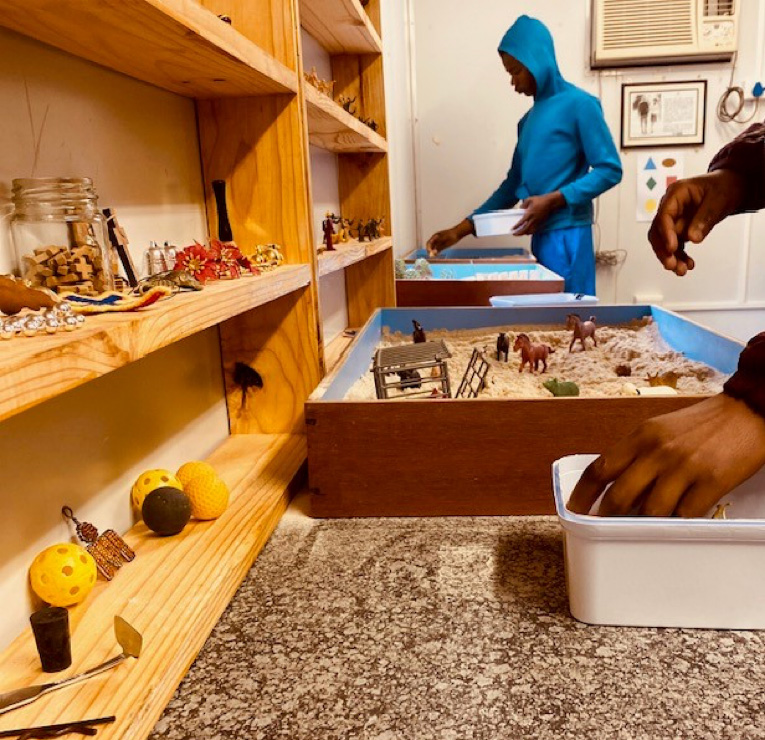
Sandplay is a therapeutic technique where each participant has a sandtray (pictured below), full of sand. They have access to numerous miniatures and they create a scene with their chosen miniatures in their sandtray. Ukuthula uses the Silent Group Sandplay method, up to 6 participants at a time working on their sandtrays.
“Sandplay, as a non-verbal, non-invasive expressive, creative activity is effective for internal processing, and activating and supporting emotional and psychological healing. Sandplay facilitates a sense of calmness, and increased awareness, activates a desire to play, and cooperativeness and supports integration and a sense of belonging.” Ukuthula website.
The post An Interview with a Sandplay Facilitator: Bongekile Ngcobo appeared first on Linda Smallbones.
]]>The post Mastery: the struggle towards growth and development appeared first on Linda Smallbones.
]]>3o August 2024
The Brene Brown quote I used in my blog on Being Deeply Human, got me thinking about the concept of mastery and how important it is in the development of a child. I thought it might be useful to explore a bit more.
First, here’s that quote:
“It may seem counterintuitive, but one of the biggest barriers to working toward mastery is perfectionism. In our leadership research, we’ve learned that achieving mastery requires curiosity and viewing mistakes and failures as opportunities for learning. Perfectionism kills curiosity by telling us that we have to know everything or we risk looking ‘less than.’ Perfectionism tells us that our mistakes and failures are personal defects, so we either avoid trying new things or we barely recover every time we inevitably fall short.” Brene Brown in Atlas of the Heart (2021)
Mastery is defined as knowledge and skill that allows you to do or understand something very well, or to have complete control over something.
A psychological definition of mastery is to have an inner sense of competence. The inner voice that says “You got this.” or a satisfied “I did that!”
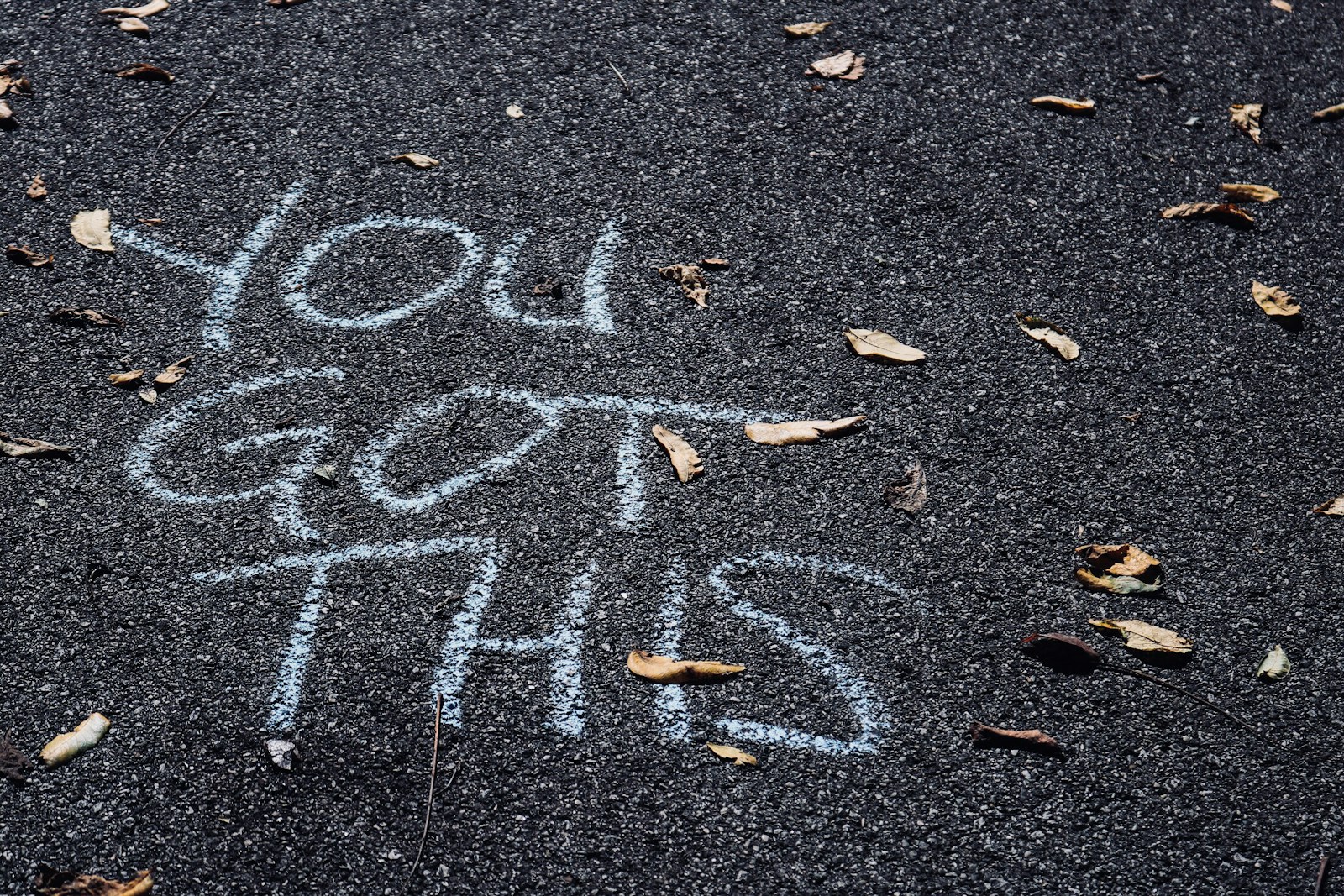
Photo by sydney Rae on Unsplash
Born to master
Toddlers rate themselves. They show a good deal of pleasure when they have been trying to do something and eventually master it. It’s a beautiful thing when you see their inner sense of competence through their words and actions “I did it!”
My son’s phrase as a toddler was “Do it ‘self” – because he knew he could, and he did. Sometimes he did take it too far, like when he was on his Papi’s lap in the game reserve “driving” and told Papi to take his hands off the steering wheel because “I know what I’m doing.” He was two! Like I said, toddlers rate themselves.
Children’s natural curiosity enables them to master as many things as they can, a handy thing, as in the first 5 years of life they learn an extraordinary number of skills.

Photo by Priscilla Du Preez  on Unsplash
on Unsplash
The struggle is needed
In general, adults do too many things for children, hover too closely when they are playing, ready to catch them at the first sign of a wobble, and intervene too quickly in normal childhood spats with siblings or friends. We intervene before it is actually necessary and potentially prevent mastery from being achieved. If there is no struggle with a new skill, they never fully achieve that inner sense of competence. The result of this is that the child feels they can’t do anything alone, and emotionally they tend to be anxious and needy. They don’t feel competent or self-confident.
I was talking to a caregiver recently who confessed that she used to jump up to help her 8 year old grandson with whatever he asked her to do, even if it inconvenienced her. She did this out of love and a desire to nurture. He would ask for something, like a glass of water from the kitchen, and she would get it. She started to realise this was creating a dependence and contributing to spoiling him and so she has stopped doing for the child what he can actually do for himself. We talked about the fact that every now and then there is no harm in doing something out of a place of nurturing, even when children can do it themselves. This might be doing a little more for them when they are sick, or when they’ve had a really tough time, but not recommended as a daily occurrence.
Struggle vs. Frustration
Violet Oaklander writes that mastery requires some struggle on the part of the child. “ A baby learns from struggle, and with each mastery experience develops the strength to deal with frustration.” from Hidden Treasure: A Map to the Child’s Inner Self. (2007) She states that it is important to differentiate between struggle and frustration, that when frustration starts to become evident, extra support be offered – in order to help the child on their road to mastery.

Photo by Kelly Sikkema on Unsplash
Here’s an example of the difference between struggle and frustration. A little girl of 8 years old sits in Maths class and doesn’t get what everyone else seems to be getting, her struggle is real but she keeps on, trying to get it. As time in the lesson goes on, her struggle escalates into frustration which manifests in tears. The teacher notices the tears to ask her what she is crying about and laughs at her for crying about Maths. Is there any mastery experienced for this child in this lesson? No, certainly not. And neither is there any support in her experience of frustration.
Mastery is about mistakes, not perfection
We can support children by helping them recognise where their personal limits are – what is your child’s “I did it!” right now? It is going to be different from someone else’s. For example, mastery for a grade one ‘neurotypical’ child is different for a grade one who is on the autism spectrum.
Sometimes we have to help children see the difference between what they can realistically do and what they think others expect of them.
Mastery is about the individual’s sense of competence, not about how perfectly they have performed. And, it includes the mistakes made along the way!
Your role as a caregiver or parent in the struggle is to notice there is a struggle, and to assess how you can best support in the moment; maybe it’s to be an empathic support, maybe it’s to step in when you can see they’re moving into frustration, maybe it’s to be a strong advocate on their behalf.
Ultimately, here is a good rule of thumb; don’t do for your child what they can do for themselves.
The post Mastery: the struggle towards growth and development appeared first on Linda Smallbones.
]]>The post When kids lie and steal: And how adults can respond appeared first on Linda Smallbones.
]]>23 August 2024
For parents who have worked hard to teach their children right from wrong, when they become aware their child has been lying and/or stealing, it’s a massive shock. Understandably, they move through a range of reactions; anger, shame, disbelief and this most often results in a punishment of the behaviour. No doubt about it, it is really hard to deal with your child being deceitful.
What if lying and/or stealing is not a moral issue, but an emotional and personal identity issue?
Lying and the sense of self
Violet Oaklander, founder of Gestalt Play Therapy, says the following about children who lie.
When children’s sense of self is poor, telling lies may help them feel more important and impressive in a given situation. Self-doubt, feelings of inadequacy and even guilt and shame can cause children to weave fantasies so that they don’t have to face their reality. Lying behaviours may develop in order for the child to preserve themselves in an environment where there is inconsistent care, or harsh, unrealistic expectations. What do I do if I will simply never measure up and I know I will be punished for this? I’ll just create the fantasy that I have, and will work to convince everyone of it, including myself.
Lying as a trauma response
Robbyn Gobbel has created this infographic, a perspective on lying as a response to trauma. (Simply click to view)
What Gobbel says is “Ultimately it almost always comes down to it’s NOT SAFE to tell the truth.”
We’re wired for connection, we’re wired to belong in the group, and we will do whatever it takes to stay in a place of fitting in. Even if it means lying or stealing.
Lying as a learned response
Please remember, if you periodically lie to others to cover your own bases, your children will copy your behaviour. They also know when you are lying to them, or they are at least suspicious of it when it’s happening. This breaks trust and also sends a message that deception is OK.
Lying as developmentally appropriate behaviour
Also remember, some lying and/or stealing is a normal part of children’s development, because they really want something, or they want to avoid getting into trouble. Also, testing boundaries and even parent’s reactions with various behaviours is completely normal. I’m referring to stealing sugar from the sugar bowl and lying about it, or taking their siblings things without asking and blaming someone else.
How do we deal with lying and stealing?
If your child, or a child in your class, is caught out stealing or caught out in a blatant lie that is beyond what is developmentally normal or innocent, what do you do?
Please do not ever do this…
Firstly, please do not name and shame them. Yes, the behaviour is wrong and consequences are needed. But there are ways to go about working with the child in the situation without shaming them. Assume you don’t know the whole story yet. Assume it is a bad choice in the moment, and be curious and compassionate first, rather than jumping to conclusions.
Do not act out or punish in anger. A trip to the police station with the child to show them what will happen if they continue on this path will not work. Making a child stand on their desk, pointing your finger at them and telling the whole class what a thief they are will also not work. Both of these scenarios have happened to children I know. It still breaks my heart.
Has it ever achieved your objectives to “make an example” of a child who has been deceptive? If it has, have you ever thought about the cost to the child’s inner world? These types of naming and shaming practices do nothing but destroy and shame children and young people. It has to stop.
Try this, instead.
Try to be calm and non-judgmental. Give consequences in line with your home rules or school policy, after some time and consideration. Most children know they are in the wrong and already feel ashamed about it, they don’t need insults or judgments heaped upon them.
In schools, follow procedure and explain to the child what the procedure is along the way. Build relationship, listen, spend time learning about the child’s context and support system. Assume that it may be very, very broken. Or it may be very harsh with many unrealistic expectations which the child can’t hope to meet and so lying becomes a way of coping.
Dig deeper and find out what caused the child to need to lie in the first place. Locating root cause, bringing it into a place of safe, warm light even though that may be painful for the child, will cause the lying and stealing behaviour to cease. If the need to be deceptive is no long there, it simply won’t happen anymore.
At home, make more time for connection and relationship. Don’t reject your child in anger, they need you more, not less in this time.
Affirm the child for who they are and keep on calling out their strengths, rather than focusing only on what they achieve. This is especially necessary if deceptive behaviour has become a habit. The habit is being sustained for a reason and may involve abuse and trauma. Professional help may be indicated where there has been significant stress, compulsive or worrying behaviour, or trauma.
The post When kids lie and steal: And how adults can respond appeared first on Linda Smallbones.
]]>The post Coming up tomorrow! appeared first on Linda Smallbones.
]]>24 June 2024
Just a reminder about the Journalling Taster online tomorrow night!
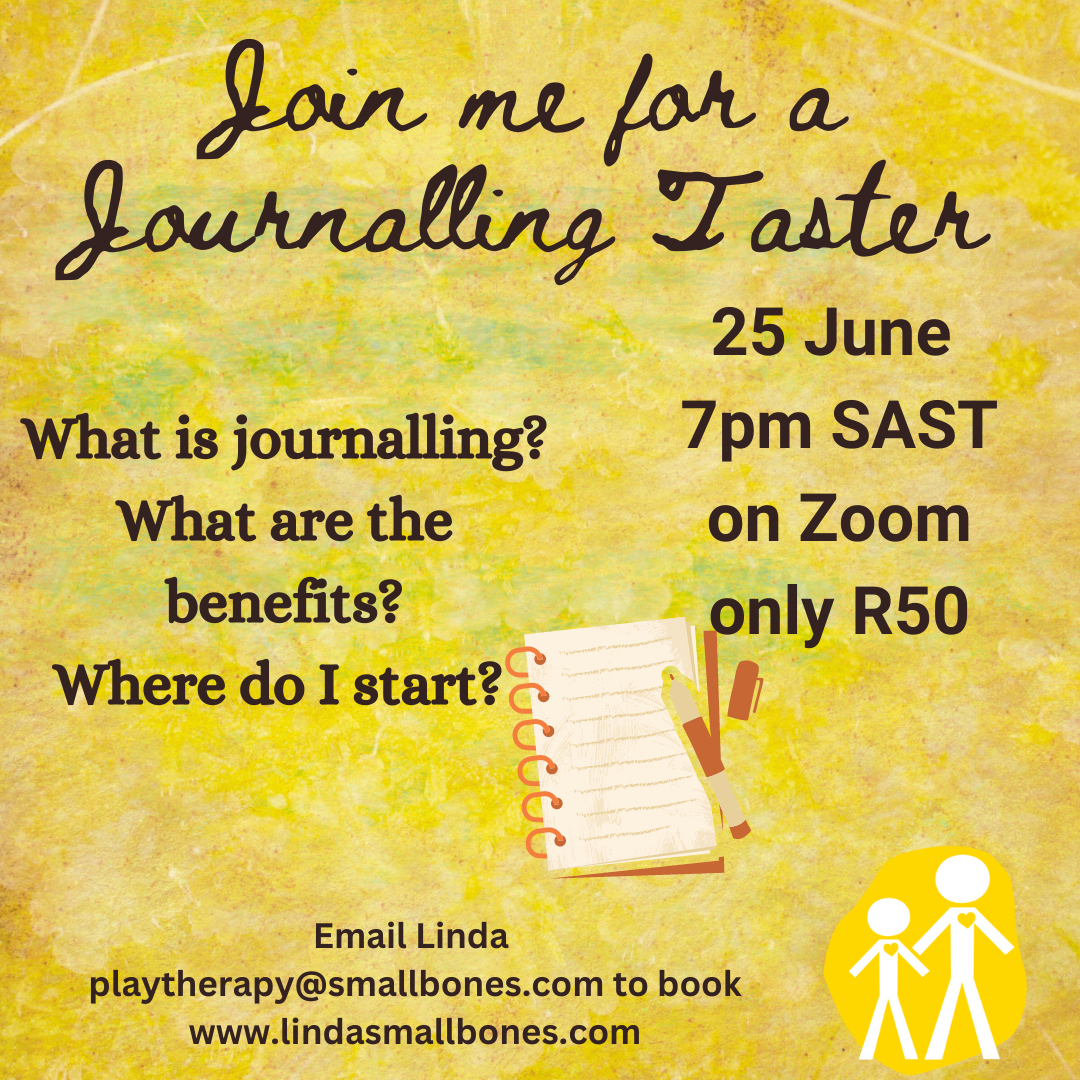
The post Coming up tomorrow! appeared first on Linda Smallbones.
]]>